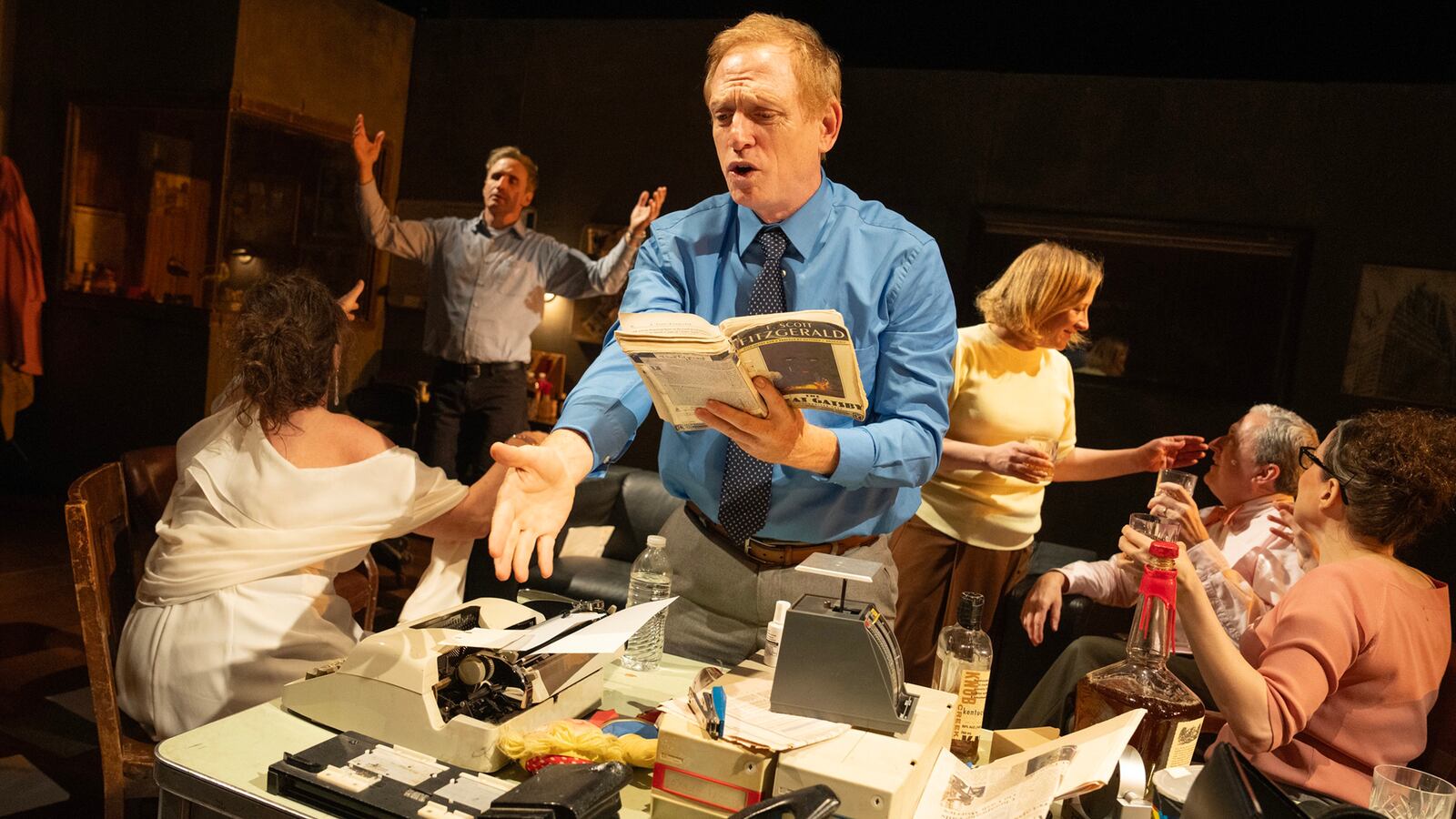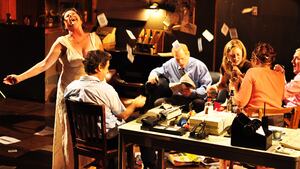For the first half hour of Gatz (Public Theater, to Dec. 1), Scott Shepherd sits on a set, conceived by Louisa Thompson, that looks like a drab office of the late 1990s. In his white-collar uniform of chinos and shirt, he reads the opening chapters of F. Scott Fitzgerald’s most famous novel as a group of characters we presume to be other office workers drift in and out, looking at him with puzzled irritation.
Hang on in there: about 30 minutes in, things start kicking off; the magic and power of Gatz—originally conceived by the Elevator Repair Service theater company 20 years ago—alternates between the simple (Shepherd’s reading is a pleasure) and complex (as actors enter the frame as characters in the novel to enact parts of the novel when other characters speak and do things).
This is my third time seeing Gatz, which may seem a little crazy given how long it lasts—but it should tell you everything about how special I think it is. With dinner breaks and intermissions, Gatz comes to eight and a bit hours total, and remains, a decade after its original Obie and Lortel Award-winning engagements, a dazzling feat of both storytelling and theater.
The real question—and this is said with baffled admiration: How does Shepherd do it? The handsome actor holds a copy of the novel, looking at its pages. But he is not reading from it; that is part of the act. He has memorized it all, as becomes obvious late in the play when the novel-as-prop is jettisoned.
Shepherd inevitably embodies the character of Fitzgerald’s own narrator, Nick Carraway. “I guess I’ve always wanted to do something that makes people go: ‘Wow, nobody else could do that!’” Shepherd once told me of memorizing the original novel. “But I’ll settle for ‘Wow, who else would ever do that?’ I don’t think I really gave the endurance issue in Gatz much consideration until we finished the first performance and I realized how exhausted I was.”
Shepherd told me that his inspiration came from seeing Mark Rylance play Prospero in a production of The Tempest at London’s Globe Theatre.
“It starts with Rylance alone on stage with a chessboard. He does the first scene, the shipwreck scene, like a kid playing with toys. Making wave crashing sounds and swinging the chessboard around like a ship tossed on the sea, doing funny voices for the chessmen,” he explained. “It was one of the best Shakespeare scenes I’d ever seen. That’s the sort of thing I try to do with the miscellaneous characters I do in Gatz. That spirit of pretending, like children do.”

Accordingly, this wonderful show, directed with astute changes of pace and delightful dashes of coloring by Elevator Repair Service Artistic Director John Collins, is its own magic act—a skilled act of conjuring unfolding in front of us, with actors not only switching between office workers and Gatsby characters, but conveying to us subtly the joy of shrugging on and off different personas and dramatic clothing.
Jim Fletcher, with his constant introductory outbursts of “Old sport,” is a (sorry) great Gatsby—charming, mysterious, otherworldly. Every time Pete Simpson’s Tom Buchanan appears on stage, the audience clenches, so tangible is his volatility and menace. Tory Vazquez’s Daisy is less an idealized object of desire and more a character liberated from the novel, wondering at all the gauzy objectification the text subjects her to. Similarly, Susie Sokol’s Jordan is as sporty as the character Gatsby wrote, but also impatient at the circumscribed way she is spoken and written about.
Subsidiary characters also exist within what you know, while also subverting or playing alongside those imaginings, like George (Frank Boyd) and Myrtle (Laurena Allan). Annie McNamara, Vin Knight, Ben Jalosa Williams, Mike Iveson, and a late appearance by Ross Fletcher as Gatsby’s father round out an engaging cast who orbit Shepherd as he reads. How they observe him, or literally bring his words to life (as characters from the novel, or in this weird office purgatory before us), can be both playful or as questioning as we sometimes feel watching Gatz. They respond to Shepherd’s reading, to Fitzgerald’s encapsulations of them—and sometimes acquiesce and sometimes rebel to both.

If those first few minutes of Shepherd’s reading lead you to wonder if anything is going to happen bar his dulcet tones, just wait for moments like in a party scene as we see paper thrown into the air, with sheafs raining down on everyone and everywhere, playing cards flicked through the air, bodies drunkenly tumbling over one another, and Tom finally, violently exploding towards Myrtle. Even though we are still notionally in the office, in our imaginations we are in the stuffy New York apartment Fitzgerald imagined in the book.
The same goes for Gatsby‘s mansion, his pool, the Wilsons’ garage, Nick’s cottage. There are no tricks of design or dress, just the settings transformed by Shepherd’s reading, Mark Barton’s lighting, Collins’ clever direction and his adept cast. Periodically closing your eyes and listening to Shepherd’s reading is the closest you will get to theatrical luxury—he achieves what reading to ourselves achieves at its best. We are transported.

Given he knows it, why bother using the book at all? Surely Shepherd could play Carraway without it. “But the play is about the act of reading,” Collins once told me—and he is right: as the hours roll on, Fitzgerald’s words grow ever more intoxicating and involving under his stewardship.
A few years ago (so maybe it is different now, with even more performances under his belt), Shepherd told me that there are only a few parts of the book that he didn’t know: for example, when another character becomes the authorial voice. Apart from that, he said, “the usual test is to offer me three words from anywhere in the book and see if I can continue from there. It is called Stump the Freak, and the freak is rarely stumped.”
Does Gatz ever drag? Yes. Towards the end, the novel stretches out in ways you may have forgotten; the production doesn’t know how to enliven or divert from this stodgy plod towards the final rousing few pages and famous sentences—green lights, borne back ceaselessly, and the rest of it. Shepherd allows himself some theatrical flourishes in these final moments, and why not. The source material has long been set aside, and he deserves a moment to truly feast on those words.

Indeed, he—and the rest of the company—should allow themselves a little more time to accept the audience’s appreciation at the end of Gatz. We were ready to lavish applause and whooping their way, but they were quite promptly outta there.
So, yes, Gatz proves there is a point to reciting The Great Gatsby, to finding magic in the words and the theater of its words, and making us understand the book in fresh ways that go beyond what we have achieved on our own as readers, or via movies and far more bombastic Broadway shows. Gatz is funny, illuminating, deep, silly, and serious. It reminds you, earnestly and with its own sense of sly mischief, of the delight of reading and the power of literature.
“There is a recitation of The Great Gatsby embedded in what we do, but that is not the totality of what we do,” Collins once told me. “In Scott as Nick, this is the story of someone becoming completely lost in a great novel. And it is a slowly emerging hallucination of the novel against a very unlikely backdrop. I think what people will see a play about the profound, imaginative experience of reading.”







